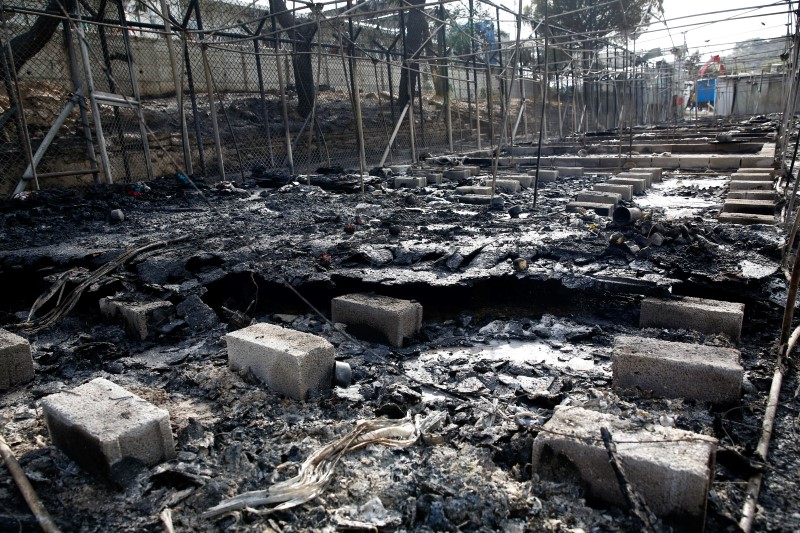
By Karolina Tagaris
ATHENS (Reuters) – Thousands of people fled a migrant camp on the Greek island of Lesbos on Monday night after fire swept through tents and housing cabins during violence among residents, police said.
The fire was over by mid-day on Tuesday at the Moria camp which houses the 5,700 migrants on the island and many people had returned, though children had been transferred to other facilities, police said.
No casualties were reported from the fire and its cause was not clear.
The United Nations refugee agency, UNHCR, linked the fire to poor living conditions and a sense of insecurity among many of the residents.
Refugees and migrants on Lesbos are stranded there by a European Union deal with Turkey preventing them going beyond the island until their asylum claims have been processed. Those who do not qualify will be deported to Turkey.
Tensions have boiled over at overcrowded camps on Greece’s islands as the slow processing of asylum requests adds to frustration over tough living conditions.
Greek media said the clashes on Monday erupted among residents following a rumor that hundreds of people would be deported.
Roland Schoenbauer, UNHCR’s spokesman in Greece, said people were “sick of waiting” in the camps. “They don’t know when their asylum claims will be processed. Some people feel they don’t have enough information,” he said.
A police official in Athens said two riot police squads had been deployed to the island.
Nearly 60 percent of the Moria camp, including tents and metal-roofed cabins, had been destroyed by the fire, a police official said. Work was underway on Tuesday to set up new tents, Police Minister Nikos Toskas said.
At least nine people were arrested on accusations of damaging property and causing unrest and were expected to appear before a prosecutor, a police official in Athens said.

The remains of a burned tent at the Moria migrant camp, after a fire that ripped through tents and destroyed containers during violence among residents, on the island of Lesbos, Greece, September 20, 2016. REUTERS/Giorgos Moutafis
OVERCROWDING
Panos Navrozidis, Greece director of aid agency International Rescue Committee, said the camp had been operating at over-capacity for months, with people crammed into the facility with limited access to water, and in conditions that do not meet humanitarian standards.
He criticized the system to process claims as “opaque and inconsistent” and said preferential treatment based on nationality led to tensions within the community.
Thousands have applied for asylum and the wait is long, ranging from weeks to months. Just over 500 people have been deported to Turkey since March but none of those who have requested asylum were among those, Greece says.
Despite a slowdown in arrivals from Turkey compared to last year, more than 13,500 migrants and refugees are now living on eastern Aegean islands, nearly double a capacity of 7,450.
“The situation is difficult,” Christiana Kalogirou, prefect of the north Aegean region, told Greek TV. “There is a great need for decongestion of the islands … in the future things could become much more difficult,” she said.
Including those on the islands, there are 60,000 migrants and refugees stranded in Greece, mostly Syrians, Iraqis and Afghans who made risky journeys in flimsy inflatable boats.
(Additional reporting Renee Maltezou; Editing by Richard Balmforth)










